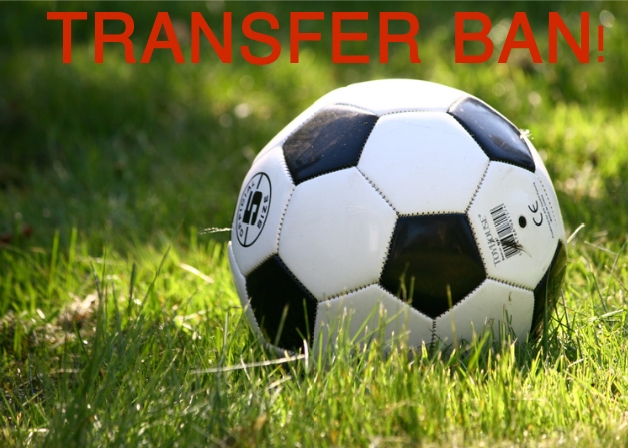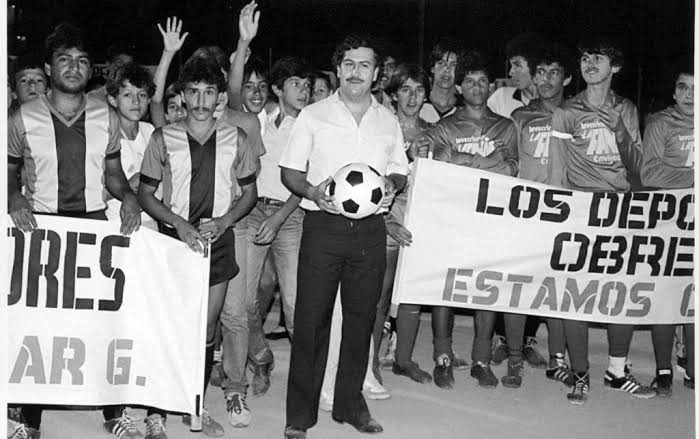Football transfers are the player movements under a contract between clubs in professional football. It refers to relocating a player’s registration from one association football club to another. In general, a football player transfer can only happen during a transfer window and in compliance with FIFA, continental and national bodies that regulate club purchases and sales.
On the other hand, a transfer ban is a prohibition placed on a football club for one or more transfer windows, usually for a certain number of years, to prevent the sanctioned clubs from taking new players into their ranks for the next season. However, teams under a football transfer ban can still publicise and register players from their youth system into the main squad. Additionally, the fined teams can acquire new personnel during the restriction. The ban only prohibits the registration of the player(s).
Transfers in professional football are pretty different from trades in American, Canadian, and Australian sports, which generally entail the exchange of current player contracts without any transfer costs. In uncommon circumstances, transfers can work similarly to player trades by allowing teams to give another player on their roster as part of the compensation for the transfer fee to reduce the financial costs. For the latest soccer news and content, come visit technicalforweb.com
Types of Player Transfers
In addition to the type of regular transfer, which entails that a player is “owned” by one club, other transfers are also prevalent throughout South America and southern Europe.
Pre-Contract
A pre-contract is a written agreement by a player and a club to take his registration later, which became more well known as a result of the Bosman ruling in 1995. A club may enter into a pre-contract with a player while still with another organisation. The player agrees to join the new club later, generally after his current contract expires. A player can sign a new contract with a new club up on six months’ notice provided under the Bosman ruling.
Although a pre-contract agreement is to secure the future registration of a player, a prior arrangement may be in place in which the club obtaining the player’s registration pays a fee to the other club to sign him sooner. For instance, Lewis Holtby, a Schalke 04 midfielder with six months left on his contract, signed a pre-contract agreement with Tottenham Hotspur in January 2013. Still, the Spurs paid £1.5 million to push through the transfer at the end of the month.
Co-Ownership
Co-ownership is a system in which a club purchases half of the player’s contract for one year and pays his wages while choosing which of the two clubs he will play for next. After the year, both clubs can bid on him in an auction, with the highest bid winning. For example, Cerci and Torino, who had paid €2.5 million for the first 50%, co-ownership with Fiorentina was beneficial; they gained access to his remaining contract after a successful year for just €3.8 million.
However, in May 2014, the Italian Football Federation announced that it would be eliminating co-ownership of players to bring Serie A in line with the rest of Europe. The existing ownership contracts might be for a year, at which point the player and club must agree.
Third-Party Ownership
Third-party ownership refers to a player’s economic rights controlled by third parties, such as football agents, sports-management agencies, or other investors. In Brazil and Argentina, many clubs are insolvent or financially restricted, which is why investors’ involvement in the “ownership” of players is so common.
Business people or other investors acquire shares in players’ economic rights and frequently cover the training and housing expenses. They are entitled to a percentage of a player’s future transfer fee in return. For example, the controversial 2009 Carlos Tevez move from Boca Juniors to Manchester City was famous for being influenced by third-party owner Media Sports Investment (MSI).
Examples of Transfer Bans
In July 2005, FIFA handed Roma a one-year transfer ban, which started on July 1 and concluded in January 2006. Philippe Mexès joined the club while still under contract with Auxerre in September 2004, prompting a one-year suspension by FIFA. The ban was to end after the January transfer window. Still, it was again upheld by the governing body owing to “Roma’s role in not only encouraging but also aggressively provoking the tampering.”
In April 2009, FIFA fined the Swiss team, Sion, because they had signed Egyptian goalkeeper Essam El-Hadary from Al Ahly before his contract expired in 2008. In 2011, UEFA threatened to ban all Swiss teams from European competition, ordering the Swiss Football Association to call. Sion eventually took a 36-point penalty.
On September 3, 2009, FIFA’s dispute resolution chamber (DRC) banned Chelsea from recruiting new players in the January and Summer 2010 transfer windows after French winger Gaël Kakuta joined the club in 2007. FIFA swiftly lifted the ban when Chelsea agreed to pay £793,000 in compensation and training fees.
In 2012, the Scottish Football Association (SFA) handed Rangers a 12-month registration suspension for violating rule 66 – bringing the game into disrepute. This ruling meant that Rangers could still bring in new players, but they could not register them with the association. The Scottish Football Association’s (SFA) decision to impose a year-long transfer ban on Rangers went to a judicial review under the Court of Session.
In April 2014, the Spanish club Barcelona was fined £305,000 and banned from registering new players for two consecutive windows, which started in June 2014. The Royal Spanish Football Federation (RFEF) was fined £340,000 and required to “restructure its regulatory framework and existing system on matters relating to the international transfer of minors in football.”
In February 2019, FIFA banned Chelsea from signing new players for two transfer windows. Following a violation of worldwide player transfers and registrations of minors under 18, the club was fined £500,000 and prohibited from signing recruits for two seasons. The punishment was reduced by FIFA ahead of the January transfer window. However, in a media release published after the ban, the club branded FIFA’s conduct as “completely unsatisfactory.”








